Post-Season Surprises - I
This feature discusses a journeyman player who had a big impact in a World Series or playoff game.
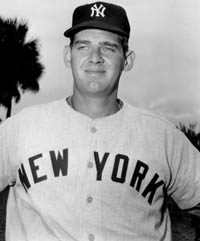
Don Larsen
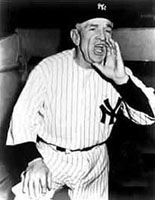
Casey Stengel
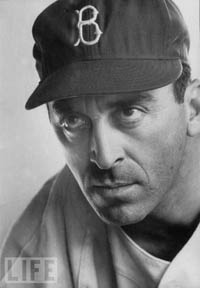
Sal Maglie
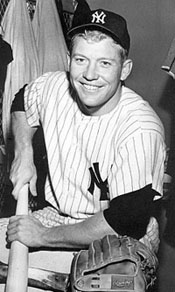
Mickey Mantle
|
Any discussion of surprise World Series heroes must begin with Don Larsen. Nothing in his background prepared anyone for his unforgettable performance in the fifth game of the 1956 World Series.
- The 26-year old 6'4" 225 lb right-hander had an 11-5 record that season with a 3.26 ERA. He started 20 games but completed only six in an era when starters were expected to go the distance.
- In his four major league seasons, Larsen was only 30-40 and lost 21 games in 1953 for the Baltimore Orioles.
- Don had "good stuff" but had a problem with control. He had 327 Ks but 300 Ws in four seasons.
- To improve his control, he had adopted the "no windup" delivery whereby he simply set his hands at his belt, kicked and fired. (You can see this in the video referenced below.)
- Don had started the second game of the '56 World Series in Brooklyn but lasted only 1 1/3 innings, giving up only one hit but walking four. All four runs off him were unearned.
From this record, the 64,519 who gathered in Yankee Stadium for Game 5 might have believed that he could throw a no-hitter if he had his stuff working. But they would also have bet any money that he would walk at least one.
Yankee manager Casey Stengel took a chance on him to pitch the crucial Game 5 with the Series tied 2-2. Even Larsen was surprised that morning when he found a ball in a shoe in his locker, Casey's way of informing him that he was starting. "I didn't think I'd get another chance to start," he said later.
The Dodger lineup featured four future Hall-of-Famers: SS Pee Wee Reese, CF Duke Snider, 3B Jackie Robinson, and C Roy Campanella, as well as 1B Gil Hodges, whom many regard as HOF worthy. Yet Larsen dominated from the start. He went to ball three on only one batter, Pee Wee Reese in the first. He threw 97 pitches, striking out seven. There were only two near-hits.
- Leading off the second, Robinson hit a hard liner that bounced off 3B Andy Carey's glove to SS Gil McDougald who threw Jackie out at first by less than a step.
- In the fifth, CF Mickey Mantle made a running one-hand catch in LC of Hodges's drive.
Larsen couldn't coast because Sal Maglie of the Dodgers also pitched a gem. Mantle's HR in the fourth broke the scoreless tie. Then the Yanks plated an insurance tally in the sixth on Carey's single, Larsen's sacrifice, and Hank Bauer's single. Maglie went the distance, allowing only five hits.
After the seventh inning, Larsen, smoking a cigarette in the dugout, said to Mantle, "Look at the scoreboard, Mick. Wouldn't it be something? Two more innings." Don later said that he knew he was pitching a no-hitter but didn't realize it was a perfect game also.
Washington Post writer Shirley Povich opened his article on the game the next day like this:
The million-to-one shot came in. Hell froze over. A month of Sundays hit the calendar. Don Larsen pitched a no-hit, no-run, no-man-reach-first game in a World Series.
The Dodgers won the next day in Brooklyn 1-0 in ten innings, but the Yanks took Game 7 9-0 behind Johnny Kucks' three-hitter.
To show how different baseball was over 50 years ago, in the off-season Yankee GM George Weiss mailed Larsen a contract calling for only a $1,000 raise. Don got his friend Arthur Richmond, a NY sportswriter, to send Weiss a letter making a case for a larger amount. Larsen settled for a $5,000 increase to $18,000 for 1957. He didn't earn the raise, going 10-4 with a 3.74 ERA. He never won in double digits again, ending his career after 14 seasons with an 81-91 record. But he will be remembered as long as baseball is played, long after pitchers with far better marks are forgotten.
|
The 1929 Philadelphia Athletics ended the Yankees' three-year stranglehold on the American League, winning the pennant by 18 games over second-place New York.
Considered one of the greatest teams of all time, the '29 A's boasted a strong pitching staff.
- Southpaw George Earnshaw went 24-8 with a 3.29 ERA.
- Lefty Grove was 20-6, his third straight 20-game campaign for Connie Mack.
- Righty Rube Walberg finished 18-11.
Having clinched first place early, Mack had plenty of time to line up his pitchers for the World Series against the Chicago Cubs. However, he astonished the baseball world by choosing none of his Big Three for the first game.
- 35-year-old Howard Ehmke had won 7 and lost 2 in 11 games for the Athletics.
- Ehmke had enjoyed two outstanding seasons with the Boston Red Sox, winning 20 (1923) and then 19 (1924).
- The Red Sox had traded him to the A's on June 15, 1926.
- Howard had been a regular starter for 2 1/2 years but in '29 had started only 8 times.
So why did Connie send Ehmke to the hill for Game One of the World Series? Mack had a hunch that the veteran's sidearm delivery and assortment of slow and slower pitches would handcuff the predominantly right-hand hitting Cubs.
- Connie got more from Ehmke than even he expected: no earned runs, eight hits, 13 strikeouts, only one W. In an era when pitch counts were rarely kept, he tossed 119 at the befuddled Chicago hitters while going the distance. Rogers Hornsby (.380), Hack Wilson (.345), and Ki Ki Cuyler (.360) ā€“ right-handed hitters all ā€“ fanned twice each.
- The A's won 3-1 before a stunned overflow crowd of 50,740.
- Howard didn't face another batter in the Series, which the A's copped in five games. He had taken advantage of his one chance to make history.
Ehmke pitched in only three games for the A's in 1930. He retired with an item on his resumé that Hall of Famer Bob Feller doesn't have ā€“ a World Series victory.
|
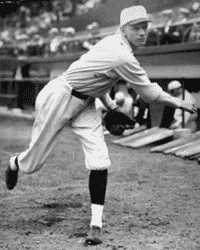
Howard Ehmke
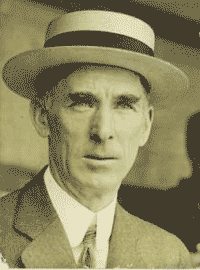
Connie Mack
|
|
|
Jim Mason played SS for nine major league seasons. He became the 14th player in AL history to hit four doubles in a nine-inning game on July 8, 1974. He also has the distinction of hitting a HR in his only World Series at-bat.
- It was Game 3 of the 1976 World Series between the Cincinnati Reds and the New York Yankees at Yankee Stadium. The Big Red Machine had copped the first two games, 5-1 and 4-3.
- Mason had entered Game 1 in the 7th inning as a defensive replacement but did not get a time at bat.
- In the 4th inning of Game 3, manager Billy Martin sent Elrod Hendricks up to bat for starting SS Fred Stanley. So Mason took the field to start the 5th.
The Reds led 4-1 when Mason came to the plate in the bottom of the 7th.
- With one out, Jim, a left-handed swinger, faced Cincy starter Pat Zachry, a righty.
- Mason: "I played against him the year before in Venezuela and had good luck against him, so I had an idea of what to expect. I was ahead in the count, 1-0, and got a pitch I could drive."
- Mason lined a HR into the lower RF stands. "I don't remember how quickly I ran the bases because I didn't hit many HRs. If I did, I probably would have run around the bases slower."
- Jim's heroics fell short as the Yankees lost 6-2 on their way to being swept by Sparky Anderson's juggernaut.
Mason: "I was disappointed I didn't get a chance to start against RHP during the postseason. I was basically used as a defensive replacement, but I got a chance to do what I always wanted to do and play in a World Series."
|

Tommy Thevenow
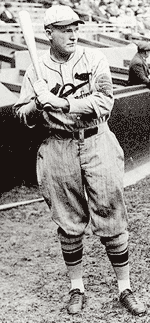
Rogers Hornsby
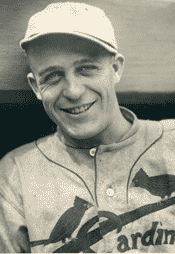
Jim Bottomley
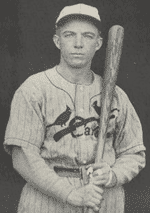
Billy Southworth |
Tommy Thevenow played a solid SS for the St. Louis Cardinals' first pennant winner in his first full season in MLB.
- Tommy hit .256 in 156 games with 15 doubles and 63 RBI. He was the lowest hitting regular in lineup, 27 points below C Bob O'Farrell. But Tommy provided solid defense, leading the league in assists, and actually finished fourth in the NL MVP voting.
- Manager-2B Rogers Hornsby had an off year for him, batting only .317 with 93 RBI. 1B Jim Bottomley led the Redbirds with 120 RBI and 19 HR on a .299 BA. 3B Les Bell batted in another 100 runs and hit .325.
Yet when the Cardinals upset the mighty Yankees in seven games in the World Series, it was Thevenow who hit .417 to lead all batters in the series, including Babe Ruth and Lou Gehrig!
- Tommy tied with his teammate Billy Southworth and Yankee CF Earl Combs with 10 hits.
- Thevenow led all players with 26 assists.
The 5'10" 155 lb SS was instrumental in three of the Redbirds' four victories.
- Game Two: Tommy went 3-4 with 2 R and 1 RBI. In the top of the seventh, with the score tied at 2, he singled after O'Farrell doubled. After the next two men went out, Southworth hit a three-run HR into the RF bleachers, the key hit that allowed St. Louis to tie the series at one game apiece. In the ninth, Tommy added another run when he hit a long fly to RC that Babe Ruth dropped while running at full speed. The SS just beat Ruth's throw to the plate for an inside-the-park HR. The round-tripper would be the last he would ever hit in his career. In fact, Thevenow holds the record for most consecutive at bats without a HR, with 3,347 from 1926 the end of his career in 1938.
- Game Six: Back at Yankee Stadium after losing two of three at home, the Cards led 3-1 in the fifth when Thevenow led off with a single and later scored on CF Wattie Holm's one-baser. Then in the seventh, Tommy's bingle started a 5-run rally that put the game away.
- Game Seven: This game is one of the most famous in World Series history because Grover Cleveland Alexander came on in relief in the seventh with St. Louis clinging to a precarious 3-2 lead. Alex fanned Tony Lazzeri with the bases loaded and then shutout the Yankees the rest of the way. What isn't remembered is that Thevenow drove in two of the Cards runs with a fourth-inning single, his second of the game.
In 1927, Thevenow broke his ankle in July and played only 59 games. This began a string of injuries that hampered him the rest of his career. After the '29 season, the Cardinals traded Thevenow to the Phillies for Heinie Sand and $10,000. He had a career-best season in 1930 when he hit .286 and drove in 78 runs in 156 contests.
Top of Page
|
30-year-old Billy Hatcher joined the Cincinnati Reds for the 1990 season after stints with the Cubs, Astros, and Pirates.
- His best season had been 1987, when he hit .296 and drove in 65 for the Astros.
- Playing mostly LF and CF, Hatcher appeared in 139 games in 1990, hitting .276 with 68 runs scored ā€“ a solid season for a journeyman but nothing that prepared the world for what happened in the World Series.
The Reds, considered severe underdogs, not only upended the defending World Champion Oakland Athletics but swept them. Hatcher's play was an important factor.
- Game One @Cinergy Field, Cincinnati: Batting second and playing CF, Hatcher went 3-for-3, with two doubles and a walk. He scored three runs and drove in one. The Reds coasted 7-0.
- Game Two @Cinergy Field: Hatcher outdid his performance of the previous day by going 4-for-4, with a triple and two doubles. He scored two runs and drove in one. With the score tied in the bottom of the ninth and runners on second and third with two outs, Tony LaRussa ordered Billy walked intentionally to get to RF Paul O'Neill. The strategy worked as O'Neill flew out. However, the Reds scored in the bottom of the tenth to win 5-4.
- Game Three @Network Associates Coliseum, Oakland: In the two-hole again behind SS Barry Larkin, Hatcher's streak of seven straight hits ended when he grounded into a DP in the first. He rapped two singles in five at-bats and scored a run in the 8-3 romp.
- Game Four @Network Associates Coliseum: P Dave Stewart hit Hatcher on the hand in the first inning. Then Billy was caught stealing. That was his only plate appearance as the hand bothered him to the point that he was replaced by Herm Willingham in the bottom of the second. Aided by Stewart's bad throw on a bunt, the Reds pushed across two in the eighth to end the Series, 2-1.
Hatcher's incredible line for the Series:
9-12 (.750), OBP .800, W 2, R 6, RBI 2, 2B 4, 3B 1, HR 0
Jose Rijo, who won games 1 and 4 with an 0.50 ERA, won the Series MVP award. However, his contribution coming off a 14-8 season with 2.70 ERA was no surprise. Hatcher was the unexpected hero.
Top of Page
|
|
|
|
Harry Brecheen, the favorite son of Broken Arrow OK, finished the St. Louis Cardinals' exciting 1946 season with a 15-15 record.
- "The Cat" led the NL in shutouts with 5 and compiled a good ERA of 2.49.
- Still, he played second fiddle on manager Eddie Dyer's staff to another southpaw, Howie Pollet, the pride of Fortier High School in New Orleans. Howie won 21 and lost only 10 with an ERA of 2.10.
- The Cardinals defeated the Brooklyn Dodgers two straight in the first league playoff series in ML history. Pollet won the first game, 4-2, on October 1.
Pollet returned October 6 to start the first game of the World Series at Sportsman's Park against the Boston Red Sox.
- Howie pitched well but lost 3-2 in ten innings.
- Brecheen took the mound for Game 2 and twirled a four-hit shutout. He drove in one of the three runs with a single and then scored another.
When the Series returned to St. Louis for Game 6, the Red Sox led 3 games to 2.
- Harry pitched another gem, keeping the Cards alive 4-1.
- Game 7 is one of the most famous in baseball history. Murry Dickson started for St. Louis and took a 3-1 lead into the eighth. When the first two batters got a single and double, Dyer signalled for Brecheen to face Wally Moses, the left-handed hitting RF.
- Moses struck out. Another left-handed batter, Johnny Pesky, lined to right.
- Just when it appeared Brecheen would get out of the jam, CF Dom DiMaggio, hitting from the right side, doubled off the RCF wall, plating the tying runs. On the play, Dom twisted his ankle and had to be replaced by Leon Culberson. This would prove to be a critical substitution.
- Brecheen retired Ted Williams on a popup to second.
The Cardinals tallied the go-ahead run in the bottom of the eighth on Enos Slaughter's mad dash from first on a double to LCF by Harry Walker, a play on which Culbertson played the ball in LCF.
- In an era before managers utilized one P as the closer, Brecheen returned to the hill for the ninth.
- He immediately got in hot water as Rudy York singled to LF and Bobby Doerr singled to short.
- When Pinky Higgins forced Doerr at second, the tying run went to third with only one down.
- Brecheen bore down and got Roy Partee to foul to 1B Stan Musial.
- PH Tom McBride grounded to 2B Red Schoendienst, who tossed to SS Marty Marion for the forceout to give the Cards their third World Series championship in five years.
Brecheen thus became the first LHP to win three games in a single World Series.
|
It was the first night game in World Series history - the fourth game of the '71 Fall Classic.
The Pirates were in trouble against the Orioles.
- The Buccos lost the first two games in Baltimore, then copped the third at home.
- Southpaw Luke Walker started and immediately ran into trouble.
- The first three batters singled to load the bases. After a passed ball plated a run, the Pirates walked Frank Robinson intentionally.
- After two straight SFs made it 3-0, manager Danny Murtaugh summoned 21-year-old righty Bruce Kison.
- Murtaugh once said of the youthful Kison: "I looked older than he does the day I was born."
Kison had done moderately well in '71 but certainly had not earned any votes for Rookie of the Year.
- He started 13 of the 18 games in which he appeared.
- Bruce compiled a 6-5 record with a 3.40 ERA in 95 1/3 innings.
- Murtaugh needed Kison to eat up some innings and keep the Birds at bay.
Bruce gave his skipper far more than he expected.
- All Kison did was pitch 6 1/3 scoreless innings, yielding only one hit.
- The Pirates scored two in the first and one in the third to tie the game.
- In the bottom of the seventh, PH Milt May singled home the go-ahead run.
- Closer Dave Giusti (30 saves) went through the heart of the Orioles order six up six down to even the Series.
The Bucs won the championship in seven. Kison never threw another pitch in the Classic but didn't have to. He had already earned a spot in Pirates lore.
|
|
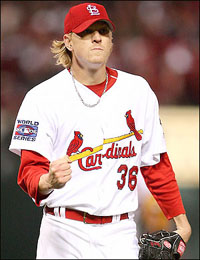
Jeff Weaver
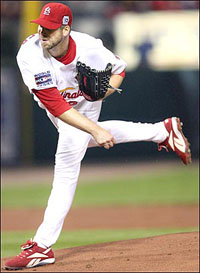
Chris Carpenter
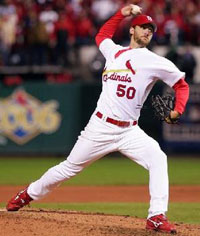
Adam Wainwright
|
On July 5, 2006, the St. Louis Cardinals traded OF Terry Evans, who had never played a ML game, to the Los Angeles Angels for RHP Jeff Weaver and cash.
- The 29-year old Weaver was in his eighth big league season, and the Cards were his fourth team.
- His career record was 81-97. His produced his best year in 2002 when he compiled a 3.52 ERA in 25 starts with the Tigers and Yankees.
- Jeff started 15 games down the stretch for the injury-plagued Redbirds, winning five, losing four, with an unimpressive 5.18 ERA.
So it came as a complete surprise to the baseball world, and even to manager Tony LaRussa and pitching coach Dave Duncan, when Weaver played a crucial role in the Cardinals' march to the World Series championship.
- St. Louis limped to the NL Central crown by 1 1/2 games better over the Astros. The Cards' 83-78 record was the second worst by one game ('73 Mets) for any post-season participant.
- Widely condemned as a playoff imposter, the Cards knew that many key players had missed significant time during the season.
- CF Jim Edmonds played only 110 games.
- SS David Eckstein, who had appeared in 158 games in '05, took the field only 123 times. However, he, like Edmonds, would participate in the playoffs.
- LHP Mark Mulder would not. A 16-game winner in '05, he started only 17 games and won only six, the last coming on June 15, before going on the Disabled List. Weaver essentially took his place in the starting rotation.
As the lowest seeded division champion, the Cardinals started in San Diego.
- 15-game winner Chris Carpenter pitched 6 1/3 strong innings to win the opener, 5-1. Adam Wainwright, who had taken over as closer from Jason Isringhausen late in the season and saved two crucial games in the last week, twirled the last 1 1/3.
- Weaver took the mound for Game 2 and hurled five scoreless innings, yielding only two hits. LaRussa's bullpen-by-committee closed out the 2-0 victory, Wainwright again twirling the last 1 1/3.
- Jeff would not be needed again in the series, the Cards closing out the Padres in four games. (The first round of the playoffs was best-of-5 at that time.)
Next came the New York Mets, whose 97 wins led the NL. Needless to say, the Redbirds were decided underdogs again.
- Since Carpenter pitched the final game of the SD series, Weaver started the NLCS. He pitched shutout ball until the sixth when the Mets plated the only two runs of the game.
- Weaver toed the slab in Game 5 with the series tied at two games apiece. he pitched six strong innings, allowing only two runs. St. Louis won 4-2. Wainwright got the save with another 1 1/3 inning stint.
- St. Louis prevailed in seven tense games.
Jeff continued his effective pitching in the World Series.
- He started Game 2, giving up three runs in five innings as Detroit won its only game, 3-1.
- Weaver returned to the hill for Game 5 to try to close out the Tigers. On a windy 40-degree evening, he responded with his longest outing, eight innings. He gave up only four hits and one earned run before Wainwright preserved the 4-2 victory. As Albert Chen wrote for sportsillustrated.com:
In an October of improbable playoff heroesĀ ... here was the latest and the last, a 30-year-old dude from SoCal who blew into his hands between pitches as he delivered the kind of virtuoso performance that defines a career.
Weaver's 2006 post-season ledger read:
5 starts, 29 2/3 innings, 25 hits, 8 earned runs, 2.43 ERA.
- It's safe to say that the Cardinals wouldn't have won their improbable championship without him.
- Wainwright and his wicked curveball were also indispensable. After saving only three games in the regular season, he finished four in the post-season. Adam threw the final pitch of all three playoff series.
Jeff never pitched another inning for the Cardinals.
- A free agent, he signed with the Seattle Mariners.
- He won only 18 more games in three seasons before retiring after the 2010 campaign when no one offered him a contract.
|
Associated Press Report October 7, 1934 after the Detroit Tigers won the 5th game of the World Series in St. Louis.
A joy-crazed band of fighting Tigers stormed into their dressing room today after conquering the Cardinals and the great Dizzy Dean, chorusing the flat prediction that the world series would end at Detroit tomorrow in triumph for them.
They are out in front now for the first time, leading the Cardinals three games to two, and they see victory ahead no later than tomorrow with Lynwood "Schoolboy" Rowe, victor in the 12-inning second game at Detroit, as the conquering pitcher.
"Rowe will start sure tomorrow," said Manager Mickey Cochrane. "We have the Cardinals on the run and I'm anxious to get it over. The pressure is on them now because the situation has been reversed. Rowe showed me the last time out that he could beat the Cardinals and there is no reason to believe he can't repeat. He's rested and ready. We are ready to snatch our fourth victory."
The 1934 St. Louis Cardinals, later nicknamed "The Gashouse Gang," sported many great players.
- Manager Frankie Frisch played 2B and hit .305.
- 1B Jim "Ripper" Collins led the team with 35 HRs, 128 RBIs, 200 hits, and a .333 batting average.
- 3B Pepper Martin batted .289.
- 22-year-old LF Joe Medwick drove in 106 and rapped 18 HR on a .319 BA.
- Dizzy Dean, whose defeat caused the Tigers' jubilation referred to above, won 30 games, the last time an NL P has done so.
Yet it was the Redbird SS, Leo Durocher, a .260 hitter that season, who sparked their comeback to snatch victory from Cochrane's over-confident bunch.
Game 6
Durocher went 3-for-4 and scored 2 runs as Paul Dean, Dizzy's younger brother, outdueled Rowe 4-3.
- 5th: Durocher singled to open the inning and, after being sacrificed to second, scored on Martin's single, the first of two Card runs that gave them a 3-1 lead.
- 7th: After Detroit tied it in the bottom of the sixth, Durocher doubled to deep CF with one out in the seventh and scored on Dean's single for what turned out to be the winning run.
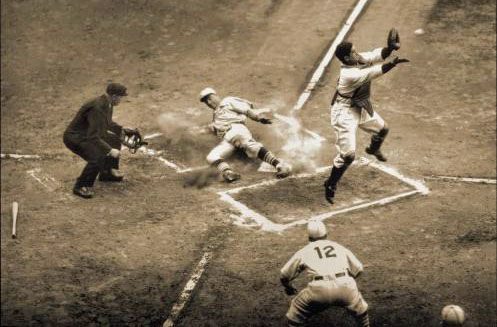
Jack Rothrock scores in Game 6 of the '34 World Series as C Mickey Cochrane takes the throw.
Game 7
Leo got two hits in five ABS with 1 run scored.
- 3rd: He flied to CF to start the inning but later singled to right as the Redbirds plated 7 to give Dizzy more than enough cushion.
- 7th: Durocher tripled to the front of the RCF bleachers and scored on Charlie Gehringer's error.
For the Series, Leo hit .259 (7-27) with 4 runs scored. However, 5 of his 7 hits came in the last two games. He also played seven games of errorless ball at SS.
|
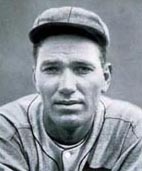
Dizzy Dean
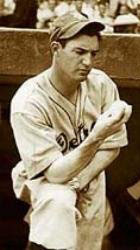
Schoolboy Rowe
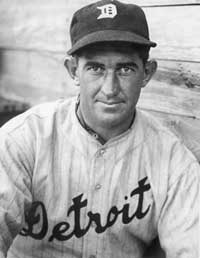
Mickey Cochrane
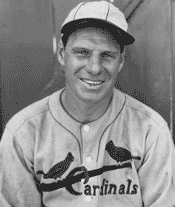
Leo Durocher
|
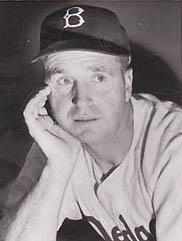
Walter Alston
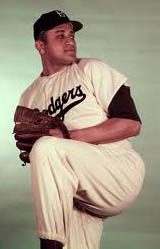
Don Newcombe
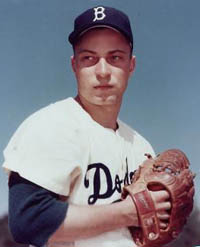
Johnny Podres
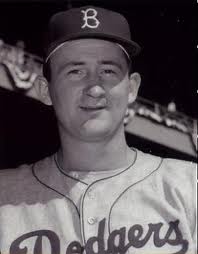
Roger Craig
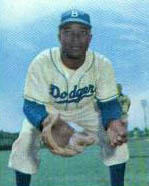
Sandy Amoros
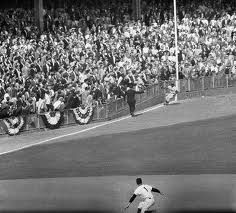
Amoros catching Berra's drive with McDougald on his way to 3rd
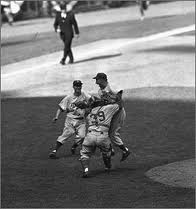
Dodgers rejoice after the last out;
39 is Roy Campanella
|
Johnny Podres, Roger Craig, and Sandy Amoros - 1955
Sandy Amoros's clutch play in Game 7 of the 1955 World Series is justly famous in baseball lore. But two Dodger pitchers also made unexpected contributions to Brooklyn's first World Series championship.
The Dodgers won their first ten games of the season, the best start in MLB history at that time.
- By the end of May, the Brooklyn Express was 32-11 and coasted to the pennant by 13 1/2 games.
- The bell cow of the staff was righty Don Newcombe, who won 20 games with only 5 losses.
- After Big Newk, the wins dropped off to 13 for Clem Labine, mostly in relief, 11 for Carl Erskine, and 10 for Billy Loes.
- Unfortunately, the Dodgers would have to face the New York Yankees, who had beaten them five straight times in the Fall Classic (1941, 1947, 1949, 1952, and 1953).
Manager Walt Alston started Newcombe in Game One at Yankee Stadium.
- The Yankees touched Don for 6 runs in 5 2/3 innings to claim a 6-5 victory behind Whitey Ford.
- Loes took the hill for Game 2 but lasted only 3 2/3 as the Yanks won 4-2.
- To cap their fantastic regular season, the Dodgers would have to do something no team had ever done in the World Series: win after falling behind 0-2. At least they would move crosstown to Ebbets Field for the next three contests.
- Alston called on southpaw Johnny Podres, who had won 9 but lost 10 during the season with a mediocre 3.96 ERA and hadn't notched a victory since August 29. On September 30, his 23rd birthday, Johnny gave the Dodgers exactly what they needed with a complete game 8-3 victory, allowing only two earned runs.
- The next day, 'Dem Bums evened the Series when Labine pitched 4 1/3 innings in relief of Erskine to take the victory, 8-5.
Whom would Alston call on to toe the slab for the pivotal Game 5?
- Instead of his ace, Newcombe, Smoky went with rookie RHP Roger Craig, who had won 5 games after a July call-up from AAA Montreal.
- Roger gave his club exactly what it needed, twirling 6 innings of 4-hit ball. Labine finished the 5-3 victory to give Brooklyn a 3-2 lead as the Series moved back to the Bronx.
Alston made another puzzling decision when he started lefty Karl Spooner, who had won only 10 games in his two seasons with the Dodgers.
- Showing he wasn't ready for prime time, Spooner got only one out, walking two and yielding three hits. The Yankees plated 5 in the first, and Ford coasted to a 5-1 victory.
- All of Flatbush was thinking, "What's Alston doin', starting Spooner? He's blowing it again!"
- Since Russ Meyer held the Yanks scoreless for 5 2/3 innings after replacing the starter, Alston was asked after the game why he started Spooner instead of Meyer. As Joe Williams wrote in his column for the Newport (RI) News the next day:
The answer to that one, of course, is that he would have had to be clairvoyant. Actually, he appeared to be conceding defeat when he called upon Meyer, whose previous contributions to Brooklyn success this year could be written on the head of a pin, with enough room still left to for Lincoln's Gettysburg Address. [Meyer was 6-2 for the year.]
- Alston told reporters after the game: "Newcombe tried to throw in the bullpen yesterday, and they told me he wasn't right, so that's that." So there you have it, Dodger fans. A sore arm was the reason Walt had skipped over his 20-game winner in Games 5 and 6.
With everything on the line, Alston turned to Podres in hopes of a repeat performance from Game 3.
- Johnny delivered more than that - an 8-hit shutout - despite being only the second Game 7 starter with a losing regular season record.
- The Dodgers managed only 5 hits off lefty Tommy Byrne and two relievers but scored single runs in the 4th and 6th.
Podres was greatly aided by a fantastic defensive play in the bottom of the sixth.
- In the top of the inning, Alston pinch-hit George Shuba for 2B Don Zimmer against right-handed reliever Bob Grim. So in the bottom of the frame, the skipper sent Sandy Amoros to LF and moved Jim Gilliam to 2B. Walt could have kept Shuba in the lineup to play left and saved Amoros for later. The manager's intuition in turning to the speedy Cuban would quickly be vindicated.
- Amoros was no bit player, having started 100 games during the season. Alston had not used him in the first two games of the Series, but Sandy had played every inning of Games 3-6, going 4-for-12 (.333). Probably to get more right-handed batters in the lineup against Byrne, Smoky went with Gilliam in left and Zimmer at 2B for the deciding contest.
- Bill Martin led off with a walk, and Gil McDougald beat out a bunt inside the 3B line.
- That brought Yogi Berra to the plate with the tying runs on base. At that point, the Yankee C was hitting .454 for the Series, with 10 hits - the most of any participant - in 22 ABs.
- Yogi sliced a liner down the LF line that looked for sure like an extra base hit. The only question was whether it would stay fair. Amoros, who was left-handed, raced over and speared the ball a few feet inside the foul line. Sandy then threw to SS Pee Wee Reese who relayed the ball to 1B Gil Hodges just in time to double up McDougald, who had assumed the ball would drop. (Watch the catch on YouTube - jump to the 5:20 mark of the video.) All observers agree that Gilliam, being right-handed, would not have caught the ball, resulting in a two-run double to tie the game and putting the go-ahead run on 2nd with none out.
- While Willie Mays' catch in Game One of the '54 Series is regarded as the greatest in World Series history, Amoros's play always appears in any Top Five list.
Podres and Amoros have rightly been lauded for their contributions to Brooklyn's first and only World Championship. But people forget that (1) Podres hadn't pitched well that season, making him a surprise hero, and (2) the Series wouldn't have gone to seven games without Craig's clutch performance in Game 5.
|
|